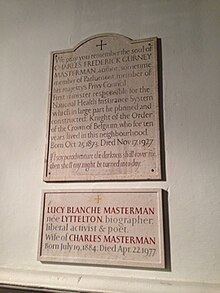
Lucy Masterman

Lucy Masterman | |
|---|---|
 Lucy Masterman, c. 1929 | |
| Born | 19 July 1884 |
| Died | 22 April 1977 (aged 92) |
| Spouse | |
| Children | 3, including Margaret |
| Father | Neville Lyttelton |
| Relatives | Lyttelton family |

Lucy Blanche Masterman (née Lyttelton; 19 July 1884 – 22 April 1977) was a British poet and diarist from the Lyttelton family. In 1908 she married the Liberal journalist Charles Masterman, who was later elected to parliament and briefly served as Chancellor of the Duchy of Lancaster. After his death, she stood for parliament unsuccessfully as a Liberal.

Early life
Lyttelton was born in Gibraltar in 1884. She was the eldest daughter of General Sir Neville Lyttelton and his wife Katherine Sarah Stuart-Wortley.[1] She joined the Fabian Society and on 2 July 1908 she married Charles Masterman. They had one son, Neville Masterman, who became a history lecturer at the University College of Swansea, and two daughters, including Margaret Masterman, a linguist.[citation needed]

Literary career
Masterman was the author of A Book of Wild Things (1910), Lyrical Poems (1912)[2] and Poems (1913). She worked as for Outlook and kept a diary while her husband was in government. In 1918, together with Elizabeth Lee, she published Wives of the Prime Ministers 1844-1906,[3] and in 1939 followed this with C. F. G. Masterman: a biography. In 1930 she edited the papers of Mary Gladstone, published as Mary Gladstone (Mrs Drew): her diaries and letters. Her final publication was London from the Bus-top (1951).

Political career
When her husband was a minister then they worked as a team. She was creditted with being tougher than her husband and her near minister status made her a confidente of LLoyd George. She and her husband were in favour of giving women the vote although her husband's resolve relaxed.[1]

After her husband died she used her diaries to create his biography.[1]

At the 1929 General Election, two years after her husband’s death, Masterman was the Liberal candidate for the Conservative-held seat of Salisbury.[1] The Liberals had last won the seat in 1923 and had come second in 1924. She finished a strong second, well ahead of Labour.[4]

Masterman remained active for the Liberals in Salisbury and was again their candidate at the Salisbury by-election in March 1931, when she again finished second; after that, she continued as prospective Liberal candidate for Salisbury until being stood down in September 1931. In August of that year the Liberals and Conservatives had joined the new National Government, and the Salisbury Liberals agreed not to contest the seat. Masterman did not stand at an election again, but she remained politically active. In June 1936 she was elected to serve on the Liberal Party Council.[5]

Election results
| Party | Candidate | Votes | % | ±% | |
|---|---|---|---|---|---|
| Conservative | Hugh Morrison | 15,672 | 47.3 | −9.0 | |
| Liberal | Lucy Blanche Masterman | 13,022 | 39.3 | +3.7 | |
| Labour | F. R. Hancock | 4,435 | 13.4 | +5.3 | |
| Majority | 2,650 | 8.0 | −12.7 | ||
| Turnout | 33,129 | 81.9 | +0.1 | ||
| Conservative hold | Swing | ||||
| Party | Candidate | Votes | % | ±% | |
|---|---|---|---|---|---|
| Conservative | James Archibald St George Fitzwarenne-Despencer Robertson | 15,800 | 53.9 | +6.3 | |
| Liberal | Lucy Blanche Masterman | 9,588 | 32.7 | −6.6 | |
| Labour | F. R. Hancock | 3,939 | 13.4 | +0 | |
| Majority | 6,212 | 21.2 | +13.2 | ||
| Turnout | 29,327 | 71.1 | −10.8 | ||
| Conservative hold | Swing | +6.6 | |||
References
- ^ a b c d Matthew, H. C. G. (23 September 2004). Masterman, Charles Frederick Gurney (1873–1927), politician and author. Vol. 1. Oxford University Press. doi:10.1093/ref:odnb/34927.
- ^ Lyrical Poems, archive.org
- ^ Wives of the Prime Ministers 1844-1906, archive.org
- ^ a b c F. W. S. Craig, British parliamentary election results 1918–1949 (Chichester: Parliamentary Research Services, 3rd edition, 1983) [1969], p. 497 ISBN 0-900178-06-X
- ^ The Liberal Magazine, 1936
External links
- Works by Lucy Masterman at Project Gutenberg
- Who's Who
- Oxford Dictionary of National Biography
- The Times Guide to the House of Commons 1929
See what we do next...
OR
By submitting your email or phone number, you're giving mschf permission to send you email and/or recurring marketing texts. Data rates may apply. Text stop to cancel, help for help.
Success: You're subscribed now !
